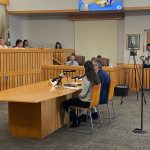New Jersey Future Blog
All Boats Rise: Investing in Climate Resilience & Communities
June 15th, 2021 by Missy Rebovich

The science is clear: climate change is here, and its threats are only going to grow more pronounced. But, carefully coordinated efforts can not only protect New Jerseyans from these threats, but can help spur economic activity, as well, making our state that much stronger. That was the message from four senior-level officials from Governor Murphy’s administration at the 2021 Planning and Redevelopment Conference, hosted by New Jersey Future and the NJ Chapter of the American Planning Association. New Jersey Economic Development Authority CEO Tim Sullivan, New Jersey Department of Environmental Protection Acting Commissioner Shawn LaTourette, New Jersey Board of Public Utilities President Joseph Fiordaliso, and New Jersey Office of Climate Action and the Green Economy Director Jane Cohen detailed how planning and redevelopment will play an important role in achieving Governor Murphy’s ambitious climate change goals at the All Boats Rise: Investing in Climate Resilience & Communities session moderated by Kathleen Ellis, New Jersey Future Board Chair.
It’s easy to think about the physical threats of climate change to our environment, such as sea level rise and the urban heat island effect, but climate change is also damaging the economic health of the state, Cohen explained. All of these forces are having a disproportionate impact on New Jersey’s vulnerable communities. That’s why Governor Murphy created the Office of Climate Action and the Green Economy, charged with addressing climate change, planning for a clean energy future, and transitioning to a green economy while prioritizing equity. Both this office and the NJ Council on the Green Economy are working to ensure close coordination between the State’s departments and agencies, many of which will play crucial roles in the design and implementation of climate change solutions. According to Cohen, “the purpose is to be intentional about how we transition to a green economy to make sure that the workforce development opportunities and economic opportunities are going to folks transitioning from traditional energy jobs into family-sustaining jobs in this new economy.”
Through the Office of Climate Action and the Green Economy and the New Jersey Department of Environmental Protection (NJDEP), Governor Murphy recently released the New Jersey Climate Change Resilience Strategy, which lays out the Governor’s approach to climate change adaptation policy. LaTourette summarized the State’s larger policy as reducing pollution and responding to climate change, both of which can be addressed on parallel and complementary tracks. Of particular concern to the NJDEP is that New Jersey municipalities understand the importance of planning for the future and use forward-looking science to determine the areas that are unsuitable for development, either because they will be underwater or because people will not have a safe way out in a disaster. This can be achieved, according to LaTourette, through the State Planning Commission center designation process and by offering incentives only to developments that have carefully considered climate risks.
The coupling of a climate change strategy with an economic strategy represents a paradigm shift in how we think about climate change policy. Sullivan explained that the administration “reject[s] the false choice that is sometimes promulgated by others that you can pursue sustainability, an environmental strategy, and an energy strategy that is forward-thinking and progressive or you can grow your economy,” but not both. Sullivan is ensuring that the New Jersey Economic Development Authority’s investments are not going to developments that do not consider climate change—it’s a bad investment of taxpayer dollars. Sullivan sees New Jersey’s approach to climate change as presenting an enormous opportunity to grow our economy. Offshore wind, solar, and electric retrofits of developments will create a wealth of jobs at all levels.
These investments go beyond housing and businesses. Fiordaliso explained that New Jersey has invested $5 billion in infrastructure upgrades, maintenance, and mitigation projects since 2012, but more severe storms will continue to cause outages and wreak havoc on our infrastructure if we don’t do something to mitigate the impacts of climate change. That’s why it’s so important to make sure that the energy we use comes from clean sources. The Board of Public Utilities (BPU) is hard at work to get New Jersey to 100% clean energy by 2050, an undertaking that will protect our state while expanding the job market. Additionally, BPU has an office of clean energy equity to ensure that all communities in New Jersey have the opportunity to participate in what Fiordaliso calls “the clean energy revolution.”
The panelists all emphasized that successful implementation of the climate change resilience strategy relies on close collaboration and a strong focus on equity and environmental justice. New Jersey Future will continue to offer input regarding the strategies and plans and looks forward to their implementation.
Related Posts
Tags: 2021 NJ Planning and Redevelopment Conference, climate change, NJPRC21, Planning and Redevelopment Conference, resilience
















